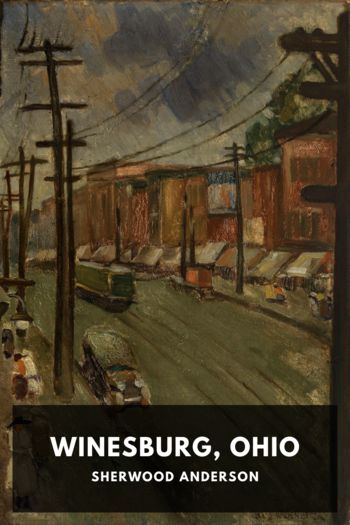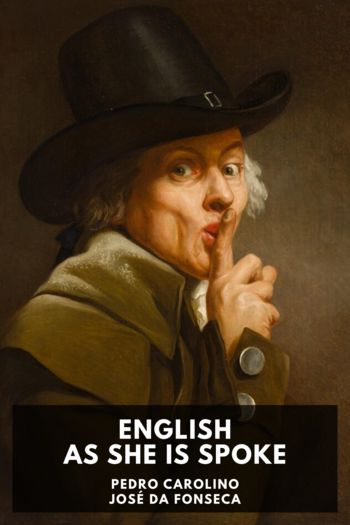Winesburg, Ohio, Sherwood Anderson [web based ebook reader txt] 📗

- Author: Sherwood Anderson
Book online «Winesburg, Ohio, Sherwood Anderson [web based ebook reader txt] 📗». Author Sherwood Anderson
Adolph Myers was meant by nature to be a teacher of youth. He was one of those rare, little-understood men who rule by a power so gentle that it passes as a lovable weakness. In their feeling for the boys under their charge such men are not unlike the finer sort of women in their love of men.
And yet that is but crudely stated. It needs the poet there. With the boys of his school, Adolph Myers had walked in the evening or had sat talking until dusk upon the schoolhouse steps lost in a kind of dream. Here and there went his hands, caressing the shoulders of the boys, playing about the tousled heads. As he talked his voice became soft and musical. There was a caress in that also. In a way the voice and the hands, the stroking of the shoulders and the touching of the hair were a part of the schoolmaster’s effort to carry a dream into the young minds. By the caress that was in his fingers he expressed himself. He was one of those men in whom the force that creates life is diffused, not centralized. Under the caress of his hands doubt and disbelief went out of the minds of the boys and they began also to dream.
And then the tragedy. A half-witted boy of the school became enamored of the young master. In his bed at night he imagined unspeakable things and in the morning went forth to tell his dreams as facts. Strange, hideous accusations fell from his loose-hung lips. Through the Pennsylvania town went a shiver. Hidden, shadowy doubts that had been in men’s minds concerning Adolph Myers were galvanized into beliefs.
The tragedy did not linger. Trembling lads were jerked out of bed and questioned. “He put his arms about me,” said one. “His fingers were always playing in my hair,” said another.
One afternoon a man of the town, Henry Bradford, who kept a saloon, came to the schoolhouse door. Calling Adolph Myers into the school yard he began to beat him with his fists. As his hard knuckles beat down into the frightened face of the schoolmaster, his wrath became more and more terrible. Screaming with dismay, the children ran here and there like disturbed insects. “I’ll teach you to put your hands on my boy, you beast,” roared the saloon keeper, who, tired of beating the master, had begun to kick him about the yard.
Adolph Myers was driven from the Pennsylvania town in the night. With lanterns in their hands a dozen men came to the door of the house where he lived alone and commanded that he dress and come forth. It was raining and one of the men had a rope in his hands. They had intended to hang the schoolmaster, but something in his figure, so small, white, and pitiful, touched their hearts and they let him escape. As he ran away into the darkness they repented of their weakness and ran after him, swearing and throwing sticks and great balls of soft mud at the figure that screamed and ran faster and faster into the darkness.
For twenty years Adolph Myers had lived alone in Winesburg. He was but forty but looked sixty-five. The name of Biddlebaum he got from a box of goods seen at a freight station as he hurried through an eastern Ohio town. He had an aunt in Winesburg, a black-toothed old woman who raised chickens, and with her he lived until she died. He had been ill for a year after the experience in Pennsylvania, and after his recovery worked as a day laborer in the fields, going timidly about and striving to conceal his hands. Although he did not understand what had happened he felt that the hands must be to blame. Again and again the fathers of the boys had talked of the hands. “Keep your hands to yourself,” the saloon keeper had roared, dancing, with fury in the schoolhouse yard.
Upon the veranda of his house by the ravine, Wing Biddlebaum continued to walk up and down until the sun had disappeared and the road beyond the field was lost in the grey shadows. Going into his house he cut slices of bread and spread honey upon them. When the rumble of the evening train that took away the express cars loaded with the day’s harvest of berries had passed and restored the silence of the summer night, he went again to walk upon the veranda. In the darkness he could not see the hands and they became quiet. Although he still hungered for the presence of the boy, who was the medium through which he expressed his love of man, the hunger became again a part of his loneliness and his waiting. Lighting a lamp, Wing Biddlebaum washed the few dishes soiled by his simple meal and, setting up a folding cot by the screen door that led to the porch, prepared to undress for the night. A few stray white bread crumbs lay on the cleanly washed floor by the table; putting the lamp upon a low stool he began to pick up the crumbs, carrying them to his mouth one by one with unbelievable rapidity. In the dense blotch of light beneath the table, the kneeling figure looked like a priest engaged in some service of his church. The nervous expressive fingers, flashing in and out of the light, might well have been mistaken for the fingers of the devotee going swiftly through decade after decade of his rosary.
Paper PillsHe was an old man with a white beard and huge nose and hands. Long before the time during which we will know him, he was a doctor and drove a jaded white horse from house to house through the streets of Winesburg. Later he married a girl who had money. She had been left a large fertile farm when her





Comments (0)